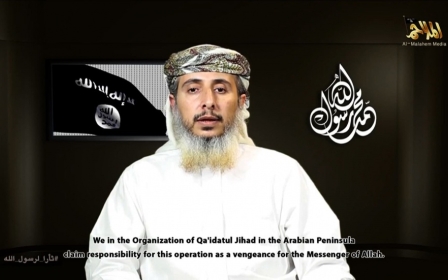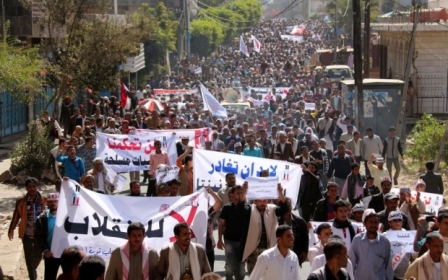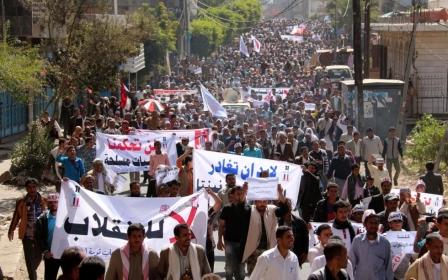Yemen Houthi militia holds widely boycotted meeting on crisis

SANAA - Yemen's Shiite militia and ex-president Ali Abdullah Saleh's party held a meeting boycotted by others parties on Friday to discuss ending the country's political crisis, as protests hit several cities including the capital.
The militia, which overran Sanaa in September, seized the presidential palace and key government buildings last week, plunging the country deeper into crisis and prompting President Abd Rabbuh Mansour Hadi and his prime minister to resign.
Militia chief Abdulmalik al-Houthi had called for a "historic" meeting to begin Friday, urging all political forces to join.
But only Saleh's General People's Congress party joined what is to be a three-day conference, heavily protected by the militia, which the former strongman is accused of backing.
Saleh vacated the palace in 2012, but he did not retire as a politician. Instead, as part of an agreement drawn up by the UN and backed by the US, he was granted immunity from prosecution and allowed to hold on to his title as head of the ruling party. Today, Saleh lives in a heavily guarded compound off a busy street in the capital where he hosts daily meetings with foreign dignitaries and tribal sheikhs. Many in the military are still loyal to him.
Saleh’s supporters maintain he is minding his own business and blame the impasse on President Hadi who they say is concentrating power and ruling through individual loyalists rather than by institutions. But diplomats, members of the opposition and analysts who spoke to Middle East Eye offer a different explanation. Saleh, they claim, far from being a neutral party, has his hands in the current conflict. They accuse Saleh of backing the Houthis, a group he fought for years when in office, both tacitly and directly, to chart a path for a return to power.
Al-Houthi, frequently compared to Hasan Nasrallah, spiritual leader of the Lebanese paramilitary organisation Hezbollah, has gained a large following of young, devout men who, observers say, look up to him as a figure of religious and political authority.
“After decades of old men ruling, al-Houthi represents a new face in the Yemeni political scene,” said Abdul-Ghani al-Iryani, a Yemeni analyst. “His politics are conservative and his campaigns are often violent but he’s a fresh face. A young man matched with power and assertiveness.”
At 32, al-Houthi may be the most powerful man in Yemen.
Meanwhile, opponents protested against the Huthis in several cities under the slogan: "Revolt until the overthrow of the coup", in reference to the militia.
They also demanded the release of scores of activists and journalists who have been rounded up by the Houthis since their overtake of Sanaa.Witnesses said the militia kidnapped the head of a students union in the universities of Sanaa and Amran, Radwan Masoud, after Friday prayers.
Sanaa University has been the focal point of anti-Houthi protests, frequently dispersed by the militia firing in the air and detaining activists.
No violence was reported in Friday's protests.
Jamal Benomar, the United Nations special adviser on Yemen, said this week that Hadi and his cabinet were effectively under house arrest, and warned that violence could erupt at any time.
But he added that a power-sharing deal "was possible," according to two diplomats who attended a session during which he briefed the UN Security Council by video link from Sanaa.
But a faction of the separatist Southern Movement announced on Thursday it would stop participating in the "pointless" talks brokered by Benomar, "which will lead the country into the unknown" and are taking place "under intimidation and a siege of the legitimate authorities."
In the central Baida province, protesters accused the UN envoy of failing to end Yemen's crisis. "Out, out Benomar," they chanted against the Moroccan diplomat.
The crisis has raised fears that Yemen, which lies next to oil-rich Saudi Arabia, could become a failed stated.
New MEE newsletter: Jerusalem Dispatch
Sign up to get the latest insights and analysis on Israel-Palestine, alongside Turkey Unpacked and other MEE newsletters
Middle East Eye delivers independent and unrivalled coverage and analysis of the Middle East, North Africa and beyond. To learn more about republishing this content and the associated fees, please fill out this form. More about MEE can be found here.




